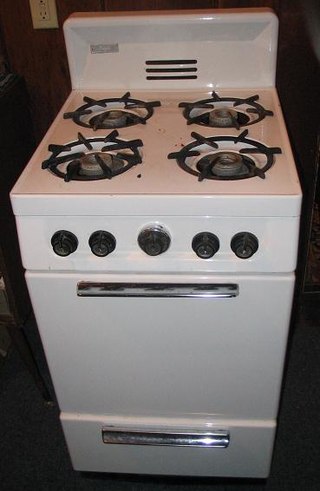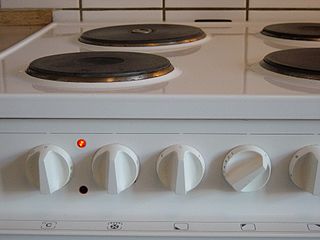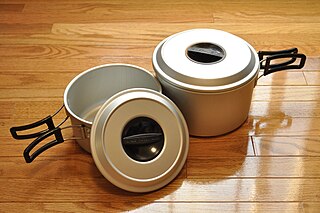David Stover may refer to:
David Stover may refer to:
Range may refer to:

The Finnish sauna is a substantial part of Finnish and Estonian culture.

First formulated by David Hume, the problem of induction questions our reasons for believing that the future will resemble the past, or more broadly it questions predictions about unobserved things based on previous observations. This inference from the observed to the unobserved is known as "inductive inferences", and Hume, while acknowledging that everyone does and must make such inferences, argued that there is no non-circular way to justify them, thereby undermining one of the Enlightenment pillars of rationality.

A portable stove is a cooking stove specially designed to be portable and lightweight, used in camping, picnicking, backpacking, or other use in remote locations where an easily transportable means of cooking or heating is needed. Portable stoves can be used in diverse situations, such as for outdoor food service and catering and in field hospitals.

Timothy Malcolm Healy is an English actor. He played Dennis Patterson in the comedy-drama series Auf Wiedersehen, Pet (1983–2004), Les/Lesley Conroy in the sitcom Benidorm (2009–2018), and Gastric in the comedy series Still Open All Hours (2014–2019).
Primus may refer to:
Scare quotes are quotation marks that writers place around a word or phrase to signal that they are using it in an ironic, referential, or otherwise non-standard sense. Scare quotes may indicate that the author is using someone else's term, similar to preceding a phrase with the expression "so-called"; they may imply skepticism or disagreement, belief that the words are misused, or that the writer intends a meaning opposite to the words enclosed in quotes. Whether quotation marks are considered scare quotes depends on context because scare quotes are not visually different from actual quotations. The use of scare quotes is sometimes discouraged in formal or academic writing.
David Charles Stove was an Australian philosopher.

A gas stove is a stove that is fuelled by combustible gas such as syngas, natural gas, propane, butane, liquefied petroleum gas or other flammable gas. Before the advent of gas, cooking stoves relied on solid fuels such as coal or wood. The first gas stoves were developed in the 1820s and a gas stove factory was established in England in 1836. This new cooking technology had the advantage of being easily adjustable and could be turned off when not in use. The gas stove, however, did not become a commercial success until the 1880s, by which time supplies of piped gas were available in cities and large towns in Britain. The stoves became widespread on the European Continent and in the United States in the early 20th century.

An electric stove or electric range is a stove with an integrated electrical heating device to cook and bake. Electric stoves became popular as replacements for solid-fuel stoves which required more labor to operate and maintain. Some modern stoves come in a unit with built-in extractor hoods.

Magic Chef, Inc. is an appliance brand currently owned by CNA International Inc.

Corn stover consists of the leaves, stalks, and cobs of maize (corn) plants left in a field after harvest. Such stover makes up about half of the yield of a corn crop and is similar to straw from other cereal grasses; in Britain it is sometimes called corn straw. Corn stover is a very common agricultural product in areas of large amounts of corn production. As well as the non-grain part of harvested corn, the stover can also contain other weeds and grasses. Field corn and sweet corn, two different types of maize, have relatively similar corn stover.

Ida Elizabeth Stover Eisenhower was the mother of U.S. President Dwight D. Eisenhower (1890–1969), university president Milton S. Eisenhower (1899–1985), Edgar N. Eisenhower (1889–1971), and Earl D. Eisenhower (1898–1968).
Stover is the leaves and stalks of field crops.

The Revolt of Mamie Stover is a 1956 romantic drama DeLuxe Color film directed by Raoul Walsh and produced by Buddy Adler from a screenplay by Sydney Boehm, based on the 1951 novel of the same name by William Bradford Huie. The picture stars Jane Russell and Richard Egan, with Joan Leslie, Agnes Moorehead, and Michael Pate, and was filmed in CinemaScope. The music was by Hugo Friedhofer and the cinematography by Leo Tover, with costume design by Travilla.
Elgie Rousseau Stover was an American songwriter, composer, producer and background singer, most famous for his associations with cousin Harvey Fuqua and Marvin Gaye, co-writing two of Gaye's songs from the singer's 1971 album, What's Going On.
A stove is an appliance that heats or cooks or both, in particular:

Cooker may refer to several types of cooking appliances and devices used for cooking foods.
McIlwain is a surname. Notable people with the surname include:
The Johnson Sea Link accident was a June 1973 incident that claimed the lives of two divers. During a seemingly routine dive off Key West, the submersible Johnson Sea Link was trapped for over 24 hours in the wreckage of the destroyer USS Fred T. Berry, which had been sunk to create an artificial reef. Although the submersible was eventually recovered by the rescue vessel A.B. Wood II, two of the four occupants died of carbon dioxide poisoning: 31-year-old Edwin Clayton Link and 51-year-old diver Albert Dennison Stover. The submersible's pilot, Archibald "Jock" Menzies, and ichthyologist Robert Meek survived. Over the next two years, Edwin Link designed an unmanned Cabled Observation and Rescue Device (CORD) that could free a trapped submersible.